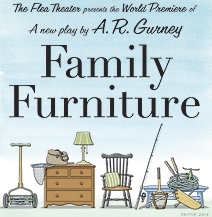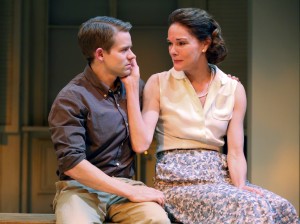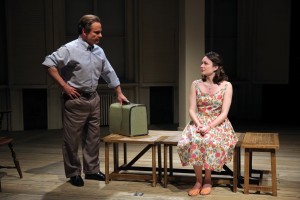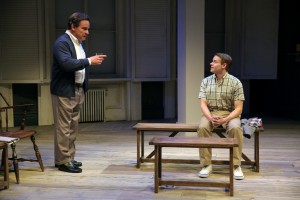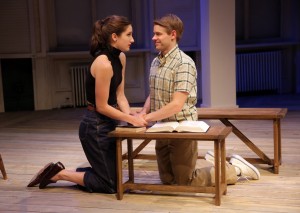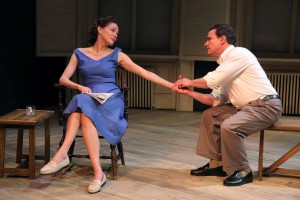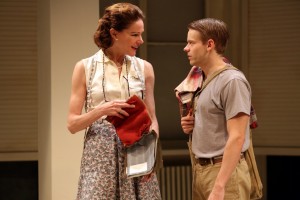THE GOOD WASPS
There’s nothing especially remarkable about A.R. Gurney’s latest offering Family Furniture, a play that investigates a family of 1950s WASPs spending the summer at their Lake Erie vacation home. There are no terrible conflicts or unsolvable problems, no new ideas or exciting subtext, it isn’t suspenseful or particularly dramatic, and its relevance for today is questionable. Yet in spite of all this, and despite the fact that I was in no mood to see a play last night, I found myself enjoying the show from beginning to end.
Smiles, Vichyssoise, table manners, martinis and sail boats, tennis and barbecues, and an extramarital affair are what fill the summertime of this upper-middle-class white Anglo-Saxon Protestant family headed by Russell (Peter Scolari), a man whose ancestors fought with George Washington and who believes it’s high time that the WASPs got their due in America. He was against Roosevelt’s New Deal, he wants Eisenhower in office, and although he likes Italians he believes their place is in Italy.
Unfortunately for him, his college-age daughter Peggy (charming Ismenia Mendes) is in love with a working-class Italian boy. Also, Russell’s son Nick (Andrew Keenan-Bolger) is dating a Jewish girl named Betsy (Molly Nordin), and his wife Claire (Carolyn McCormick), unbeknownst to Russell, is having an affair with a family friend.
The kids know of the affair and it feels like Nick’s struggle with this knowledge is, or was at some point, at the center of Mr. Gurney’s play; there is even a scene in which the conflict-inclined Betsy convinces Nick, who doesn’t know if he should confront his mother or not, to perform a section from Hamlet for Claire, in hopes that she will get the hint and end the affair.
But in fact the much more interesting character turns out to be the father, Russell. We think we have him pegged in the beginning – a right-wing Republican, quietly arrogant, politely racist, with little real understanding or meaningful sympathy for those outside his privileged demographic (the working class, the immigrants, the poor). But by the end of the play we learn that he is a man significantly broader and deeper than at first seemed possible.
We are informed of many facts about mid-century American WASPish culture in Family Furniture. But most of these we’ve heard before, and they don’t exactly lead to any revelations or profound insights. The dialogue is well-written but completely straightforward; it doesn’t transcend its literal subject matter. A few jokes with literary references sound a little pandering, a little cheap. And yet the world that’s created I found seductive in its pleasantness; I liked spending time with this family. Much of that is due to some very fine personifications by the actors, especially the excellent Scolari and the sympathetic McCormick.
Perhaps most responsible is Thomas Kail’s smart, gentle and precise direction. He helps the performers bring authentic life into a world where not very much happens. And he truly creates a summer-cottage mood on Rachel Hauck’s very simple but effective set–essentially a few wooden benches and an armchair–which is competently lit by Betsy Adams. Especially magical is a scene that takes place on a sailboat between Russell and Peggy; with actors’ total commitment to the reality of the scene in all its details, specific direction, and outstanding sound work by Bart Fasbender, we truly feel like we are out there with them on the water.
photos by Joan Marcus
Family Furniture
The Bats at The Flea Theater
41 White Street between Church and Broadway
ends on December 22, 2013
for tickets, call 212.226.2407 or visit The Flea
